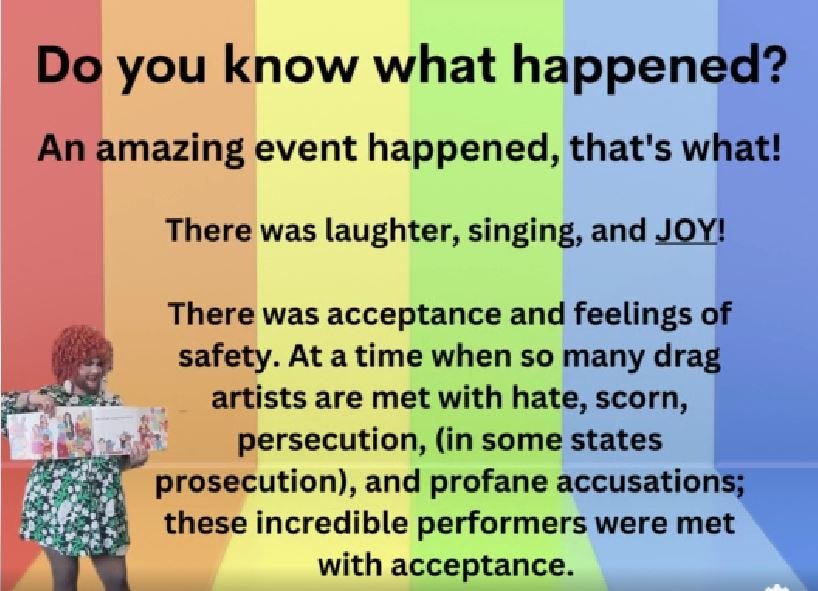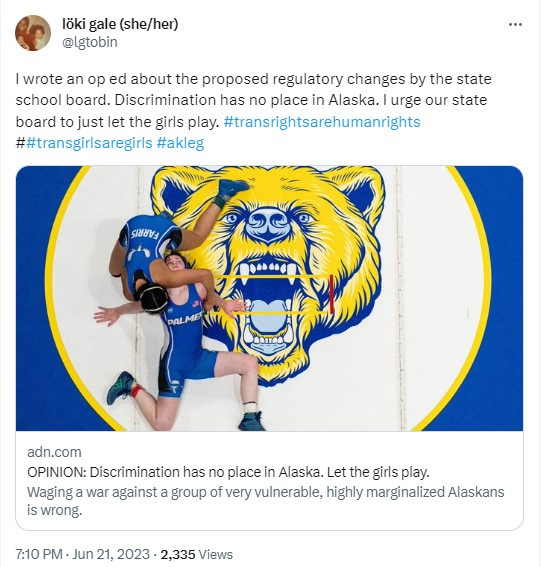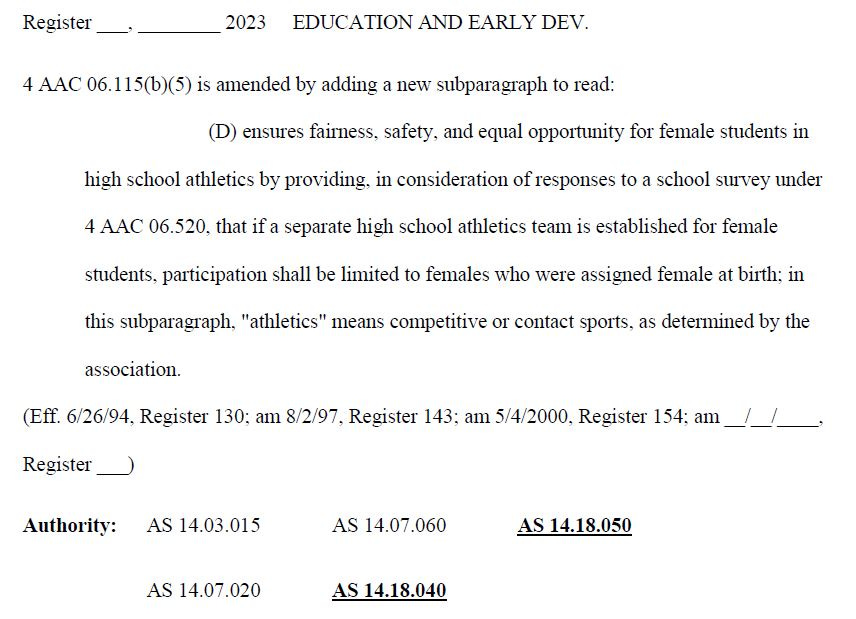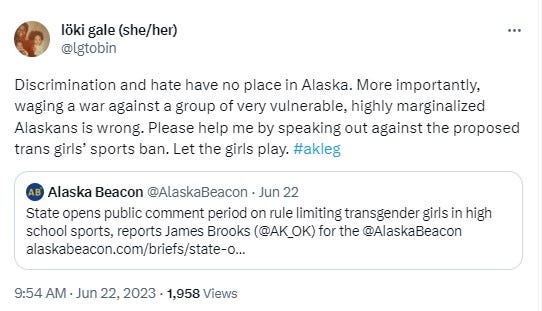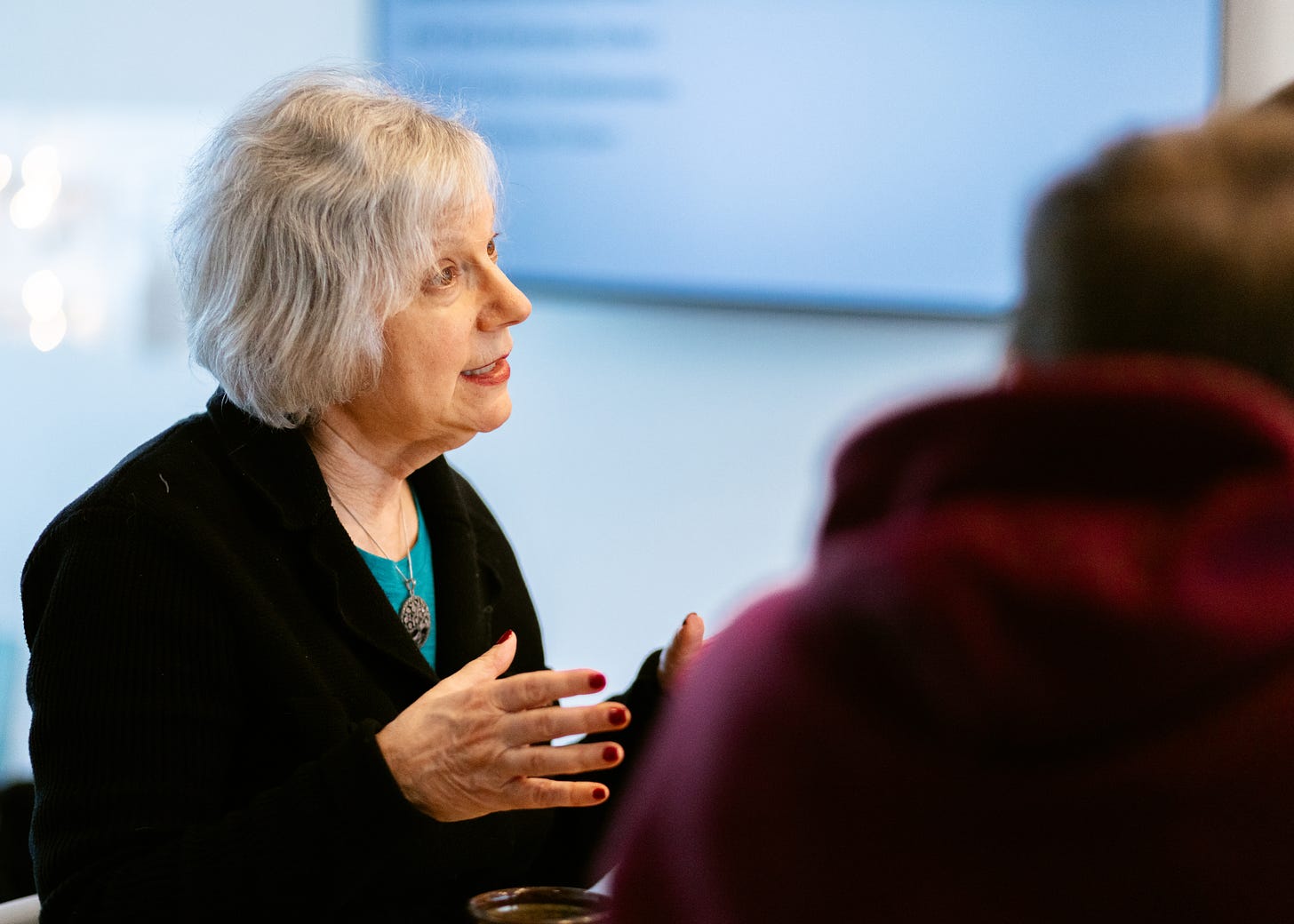Discrimination has no place in Alaska
Submit public comments to stop an anti-trans regulation sponsored by the Alaska Board of Education.
I lettered in wrestling all four years of high school. Today, that is not groundbreaking, but back in the late 1990s, it was pretty radical. I went to a small school, so I definitely had notoriety, but for the most part, nobody blinked an eye when I ran out onto the wrestling mat.
During one of my first tournaments away from home, two boys forfeited matches against me because of their school’s policies. I remember being confused and frustrated. Looking back, I wish I had wrestled those boys because I’m pretty sure I would have won. However, I’m glad my coach was there to remind me that winning isn’t everything.
Now, some might argue that high school sports are about winning, but for most high school athletic competitors, winning isn’t everything. Participating in sports helps young kids do better in school, develop interpersonal communication skills, and gain valuable life experience along the way. Simply put, high school sports are about learning “integrity, respect, perseverance, leadership, teamwork, and inclusivity.”
Those are the values of the Alaska School Activities Association (ASAA), which is a nonprofit entity that operates Alaska’s public school interscholastic activities. ASAA policies follow current Alaska education practices of maximizing local control by allowing school districts to set athletic participation policies that best fit their communities. This results in a wide breadth of diversity within our school athletics. Unfortunately, local control over participation in school athletics might soon change. Currently, the Alaska State Board of Education is considering harmful and exclusionary changes to its long-established policy of nondiscrimination in competitive sports. The policy change seeks to override local control in favor of a big-brother approach.
What makes the proposed policy shift by the State Board of Education even worse is it actively discriminates against trans girls. Christopher Rufo, who is one of the major architects of the national campaign against trans people and trans athletes, testified last year in the Alaska State Legislature in favor of Senate Bill 140, which included a similar ban as the one being proposed by the State Board of Education. Rufo has been very public that he and others are using anti-trans bias to manipulate voters and public policy. Targeting trans girls depends on the obfuscation of facts and manipulation of parental fear. If any of what the anti-trans movement was saying was actually true, then we’d have seen more reports than the one trans athlete in Alaska from 2016.
Women come in all different shapes and sizes. I know women with testosterone imbalances, women with chromosomal differences, women who do not have uteruses, women who do not have breasts, childless women, child-free women, women without ovaries, masculine presenting women, and hyper-feminine women. If the proposed changes to interscholastic activities go through, every high school girl who doesn’t meet some arbitrary expression of womanhood will have her privacy jeopardized.
The anti-trans policy being considered by the Alaska State Board of Education and Early Development puts the very few trans girls residing in our state in fear of being outed and forced to wear the proverbial red T on their chests. Really, it puts every gender-nonconforming girl at risk. Does your daughter wear her hair short? Is she taller than all the boys? Well, it’s a slippery slope that we are headed down and it could have unimaginable ramifications for your child.
I’m dumbfounded that in Alaska, which has a right to privacy enshrined in the Constitution, we would allow for such a blatant violation of our rights simply to chase a problem that history, educators, and coaches say doesn’t exist. What does exist is the very real education crises of retaining our teachers, addressing falling math scores, supporting students’ access to mental health services, and really addressing the fiscal uncertainty of our public schools.
The women who came before me didn’t fight for my right to vote, determine my own future, or even wear my hair short just so I could turn around and hold down those who came after me. It is my responsibility to fight for every person to be who they are where they are. But more importantly, it is my privilege to use my voice to defend the freedom of every Alaskan to express themselves however they choose.
Discrimination and hate have no place in Alaska. More importantly, waging a war against a group of very vulnerable, highly marginalized Alaskans is wrong. Please help me by speaking out against the proposed trans girls’ sports ban. Let the girls play.
The process to submit public comments
The Alaska Board of Education and Early Development is accepting written comments until July 21 on the proposed regulation dealing with school district interscholastic activities. I do not support the use of the regulatory process to hurt and target members of our community, which is exactly what this regulation does to trans-women.
You can read the proposed regulation below. Please note that the proposed regulation only applies to female sports and not male sports. This is yet another example of the patriarchy seeking to protect women who in reality do not need protection.
The process to submit public comments is simple. Send an email to deed.commissioner@alaska.gov or call (907) 465-2806. You can also submit comments online at https://education.alaska.gov/regs/comment.cfm. Remember, the deadline to submit written comments is July 21.
The final opportunity to comment on the misguided regulation targeting trans-athletes in Alaska is during a hearing on July 26. The public comment period will be held that morning from 8:45 am to 9:45 am using the Zoom online meeting platform. Click here for details.
Kayla’s Corner
Summer is finally here: flowers are blooming with color and the winter white has finally changed to lush green mountain slopes. And in an unusual mix of a traditional religion and transgender activity, I went to my first drag queen storytime. It was sponsored by and held at Temple Beth Sholom. I asked Rabbi Goodstein how it came to be. He said that a member of the congregation thought the Sunday school children would enjoy it. Someone mentioned the date on FaceBook and then a crush of reservations tumbled in from other parents and even adults without children. It went from a simple reading for a small group of Sunday school children to a secular event. Without warning the president of the congregation’s board suddenly found herself worrying about security because so many other similar announcements were met with angry protests.
But the day came with nothing but a temple crowded with people, from the very young to people as old, waiting for some fun. Our entertainers were fun and joyful but with a serious message: be yourself. The stories they read were similar, like a boy who grew wings and, much to his delight, could fly but he had to hide his wings under a heavy coat regardless of the weather to avoid looking different. Eventually, he reveals himself to the delight of his friends and shouts of approval from our young listeners. The songs were more diverse. Some were old standards, The Wheels in the Bus Go Round and Round, and Old MacDonald Had a Farm, but they also sang two Disney songs, Let It Snow (anger at others for not accepting your differences) and the song from The Little Mermaid about the sadness of not having feet like all the bipeds above water. All the messages were; accept who you are.
The performers stood on the bema, where prayers and sermons are led, in front of the structure that houses the Torah (first five books of the Bible), and beside a glass wall art piece representing Genesis. Some children danced, and many sang along. A few children wandered the bema. One asked a performer not to step back. The performer laughed as she foresaw the next day’s headline, “Giant Drag Queen Crushes a Child During Reading”…the adults laughed. There were no protests…only smiling faces.
It’s estimated that five percent of the U.S. population identifies as transgender. That’s more than double the estimated number of Jews. Both trans people and Jews have a common problem. In the case of transgender people, it’s being yourself and asking others to be whoever they are. Unfortunately, that’s considered grooming by many. For Jews, it’s the unfounded notion that less than two percent of the U.S. population controls the movies, money, and politics. No wonder Congregation Beth Sholom opens its doors to others vilified by those who live in fear and prejudice.
